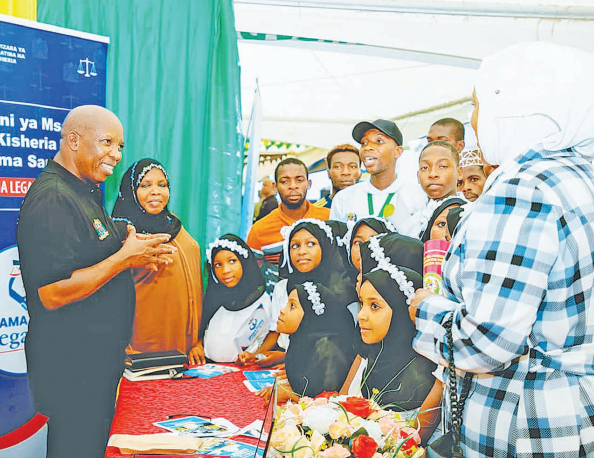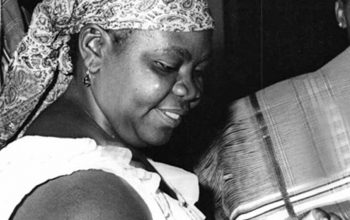State’s Legal Aid campaign: A catalyst for justice

TANZANIA: IN a determined effort to ensure equality and prosperity for every Tanzanian, the Sixth Phase Government, under the astute leadership of President Samia Suluhu Hassan, is deeply committed to strengthening access to legal rights for all, with a particular focus on vulnerable groups.
This robust and spirited legal aid programme has become a beacon of hope for many citizens, giving them a voice and empowering them to seek justice that previously seemed unattainable. Significant successes have been achieved through this initiative, profoundly impacting the lives of Tanzanians across various spheres.
A comprehensive analysis of statistics from the regions reached reveals that a total of 25 regions have benefited from this programme.
According to the Spokesperson for the Ministry of Constitution and Legal Affairs, Hyasinta Kissima, the programme has reached over 2.7 million people in 25 regions.
The dedicated teams visited 180 local government authorities and participated in the Nane Nane and Sabasaba festivals to provide services.
Among the beneficiaries, 1,390,535 were women and 1,381,960 men. Furthermore, 7,570 individuals in detention received assistance.
Ms Kissima explained that the regions exhibited variations in the distribution of people reached. For instance, in the Mwanza Region, the team was able to reach 210,364 people, while other regions recorded higher or lower numbers.
She further noted significant differences among regions in terms of the number of local government authorities, wards and villages reached. For example, the Dodoma Region accessed 80 villages/streets, 240 wards and several local government authorities, while other regions showed different figures.
A total of 25,299 disputes were received through the campaign, with Kagera Region leading with 1,900 disputes, followed by Tanga (1,682 disputes) and Kigoma (1,646 disputes). Rukwa Region recorded the lowest number of disputes, at 316.
The regions displayed considerable differences in the number of disputes received, ongoing and concluded. For example, the Mbeya Region had the highest number of received (1,444), ongoing (936) and concluded (508) disputes, while other regions had fewer.
Statistical analysis from the campaign has illuminated the difficult circumstances faced by various disadvantaged individuals in their pursuit of justice. Among all the disputes handled, land disputes were the most prevalent.
Reports indicate that a total of 5,474 land disputes were recorded across all regions, alongside 1,507 disputes related to family and marriage matters. Additionally, there were 1,277 inheritance-related disputes and a significant number of genderbased violence cases, with 972 incidents reported.
Moreover, there were 1,405 child maintenance cases filed by men and 515 by women. Criminal and civil cases totalled 1,225 for men and 353 for women, with 1,736 civil cases. Employment disputes were also identified as a significant challenge.
The analysis of the report clearly demonstrates the ongoing need to address these disputes and provide appropriate support to those affected. It also underscores the importance of campaigns aimed at raising awareness and promoting peaceful conflict resolution, where President Samia’s strong leadership is evident.
The Editor of HabariLEO newspaper, Mgaya Kingoba, states, “Looking at the legal issues most frequently reported through this programme, including land disputes, gender-based violence and inheritance matters, reveals the immense thirst of citizens for access to legal aid. This response indicates that this programme addresses key issues affecting the daily lives of Tanzanians.”
The success of cases handled through this assistance is highly encouraging. Out of the 25,299 disputes received, 5,853 cases have been concluded and 19,446 are ongoing. The conclusion of these disputes demonstrates that legal aid is yielding tangible results and delivering justice to those in need.
ALSO READ: Mama Samia Legal Aid Campaign Initiative revives hope for land dispute victim
An example of a successfully concluded case involves a domestic worker, Anitha Gabriel, who was paid all the wages she had been unjustly denied by her employer after her case was heard. Anitha was claiming over seven hundred thousand Tanzanian shillings from her employer.
The case concluded favourably as Anitha received her money in the presence of the Bugogwa Ward Chairman, Jagan Said and the Igombe A Street Chairman, Mathias Mkono, both from Ilemela.
Furthermore, in Korogwe, Tanga Region, Jane Athumani Pochi, a resident of Korogwe, had her land, which had been seized for three years, returned to her. President Samia’s legal aid team helped resolve the dispute that arose after her husband sold part of the land without her involvement.
Jane Athumani expressed her gratitude to President Dr Samia for initiating the campaign, stating that it has been a saviour, especially for vulnerable citizens.
Additionally, the coordinator of Mama Samia’s Legal Aid Campaign in Pangani District, Judith Kapaga, after hearing the case of Hadija Maramla, directed the leadership of Madanga village to return to her the threeacre ancestral land that the village government had unlawfully taken.
A particularly compelling case example comes from Lushoto, where Aisha Chogogwe (31), a resident of Kwefingo village, sought assistance from Mama Samia’s Legal Aid Campaign (MSLAC) after allegedly receiving death threats from her deceased husband’s younger brother, who passed away on March 11, 2021.
The younger brother inherited Aisha, his elder brother’s wife, but later, the mother-inlaw and the inheriting brother pressured her to leave the house she had built with her late husband so that the inheriting brother could marry another woman.
The Legal Aid team, led by the Gender and Children’s Desk Officer, Mwajuma Shaaban, provided Chogogwe with legal assistance and helped her file charges at the Lushoto Central Police Station.
The Minister for Constitution and Legal Affairs, Dr Damas Ndumbaro, has stated that the Government has allocated a budget to ensure the programme’s success and deliver swift and impactful results. He emphasised, “It is Tanzanians’ taxes that fund this assistance and this is the essence of good governance and President Samia’s vision.”
Legal aid has been a crucial catalyst for the economic empowerment of citizens. Beyond the examples mentioned, numerous women and other vulnerable groups have been able to secure their economic rights through this assistance, such as inheriting property and resolving small business disputes. Success stories illustrate how justice can transform people’s lives.
Legal aid significantly contributes to ensuring equality before the law for all groups of Tanzanians and since its inception, this programme has also helped reduce gender-based violence and violence against children by empowering victims to seek their rights.
Looking at the outcomes, this programme directly contributes to achieving Sustainable Development Goal 16 (Peace, Justice and Strong Institutions) by ensuring access to justice for all. It also supports other goals such as gender equality and poverty reduction by enabling people to secure their fundamental rights.
The International Community has recognised and commended Tanzania’s efforts in strengthening access to legal aid, acknowledging the progress made thus far.
Given the developments in Tanzania, President Samia has received international praise for investing in inclusive justice systems, demonstrating a genuine commitment to ensuring justice reaches all people – not just the wealthy.
Dr Ndumbaro, upon returning from the Commonwealth meeting, explained how the international community views Tanzania because of this programme. He noted that other countries have decided to learn from this system.
Notable aspects of Tanzania’s programme include the involvement of various stakeholders and the focus on vulnerable groups. An inclusive system involving the government, civil society organisations and private lawyers has made this programme sustainable and impactful.
It is important to remember that this programme has both governmental and social strength. To ensure its success, the Government has established legal aid centres in various regions and collaborated with civil society organisations, religious institutions and private advocates to provide these services.
Furthermore, this programme operates under the Legal Services Facility (LSF), the Legal Aid Department of the Ministry of Constitution and Legal Affairs and other stakeholders.
Considering these collaborations, the Sixth Phase Government’s legal aid programme undoubtedly serves as an excellent example of how caring leadership can bring positive changes to the lives of citizens.
Indeed, the high number of people who have come forward to utilise the programme, which aims to reach ordinary citizens – especially women, children and marginalised groups – and the decisions reached and those still being pursued demonstrate the critical importance of access to justice for those unable to afford legal services.
The programme has ensured that even low-income individuals can access free lawyers or legal advice on matters such as inheritance, marriage, land disputes and gender-based violence, as the statistics indicate.
The benefits of this project include the implementation of constitutional rights as enshrined in Article 13 of the Constitution of Tanzania, which emphasises equality before the law.
Mama Samia’s legal aid programme has not only helped Tanzanian citizens access justice affordably but is now viewed as a beacon of justice and social development for other nations, particularly those grappling with challenges of inequality before the law. Through these efforts, Tanzania has reasserted itself globally as a leader in inclusive justice reform





